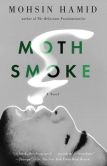The Participant Reader: Mohsin Hamid

 We’ve been serious fans of Mohsin Hamid’s work since his debut novel, Moth Smoke was selected for the Discover Great New Writers program in 2000. His second novel, The Reluctant Fundamentalist, was a 2007 B&N Recommends selection, and is now a film by Mira Nair, staring Keifer Sutherland, Kate Hudson, Liev Schreiber and Riz Ahmed.
We’ve been serious fans of Mohsin Hamid’s work since his debut novel, Moth Smoke was selected for the Discover Great New Writers program in 2000. His second novel, The Reluctant Fundamentalist, was a 2007 B&N Recommends selection, and is now a film by Mira Nair, staring Keifer Sutherland, Kate Hudson, Liev Schreiber and Riz Ahmed.
How to Get Filthy Rich in Rising Asia (out on March 5) begins with a familiar trope: impoverished rural boy makes big; but Hamid’s crisp imagery and often wry tone, mesmerizing prose and visionary storytelling (water rights are key), make How to Get Filthy Rich in Rising Asia a peerless political novel, one that is also already receiving rave reviews from The New York Times and The Washington Post.
Like The Reluctant Fundamentalist, How to Get Filthy Rich in Rising Asia is written with the immediate intimacy and underlying urgency of the second person POV — a device not often seen in modern literature (perhaps because it requires a level of narrative control that few writers are able to pull off.)
We asked Mohsin what drew him back to the second person perspective, and this is what he told us. —Miwa Messer
I didn’t set out to write my third novel, How to Get Filthy Rich in Rising Asia, in the form of a self-help book told in the second person about “you.” In fact, I tried desperately to write it in other, straighter, ways. But I failed. Douglas Adams says that the secret to flying is throwing yourself at the ground and missing — which pretty much sums up my approach to novel-writing.
The form any novel takes matters. Form is the container a novel uses to carry the liquid of its story. A changing human environment requires changing forms, a thermally-insulated flask, say, where previously a teacup might have sufficed. The novel stays novel by evolving, by finding new ways to pass stories into the consciousness of readers.
The second person, which isn’t used often, has some special attributes. It makes the reader-writer relationship more explicit, draws attention to it, to you reading and me writing, which is to say to the reality of how a book functions. Second person opens up formal space for all kinds of play, and also, maybe, for a chance at a kind of honesty.
I say honesty because I don’t view the reader of a novel as a passive audience member. I view readers as participants. Readers are imagining a novel out of printed words into something else, something they are co-creating in their minds: an individualized world of people, emotions, images. For me, that’s what gives novels their power.
And because readers are participants — players of novels, as musicians are players of music — it felt important to me, in this novel, to be able to speak to readers directly, to be able to use the “you” of the second person, blurring boundaries between character, reader, and writer, freeing us to move in different ways.
How to Get Filthy Rich in Rising Asia is also written, partly humorously but partly seriously, as a self-help book. This isn’t as strange as it may seem. Literary novels are often marketed as a kind of self-help: “If you read this book,” we’re told, “it will be good for you. You’ll learn about place x, or about time y, or you’ll be comforted, or you’ll know more about a problem that should be bothering you.”
I wanted to explore this notion that novels are a species of self-help book. How could writing a novel help a writer? How might reading a novel help a reader? These were some of the questions whirling around in my head. The six years I spent writing How to Get Filthy Rich in Rising Asia allowed me to hunt for answers to them. Hopefully, reading the book — playing the book — might do something similar for you.
So, should you decide to go ahead, we’ll spin a tale together. It will be the story of an entire life, from childhood to old age, from poverty to wealth, and from love to… But no, first things first. If we start, best we start at the beginning. —Mohsin Hamid